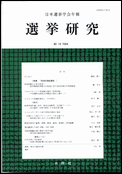Volume 34, Issue 1
Japanese Journal of Electoral Studies
Displaying 1-13 of 13 articles from this issue
- |<
- <
- 1
- >
- >|
-
2018 Volume 34 Issue 1 Pages 5-21
Published: 2018
Released on J-STAGE: July 16, 2021
Download PDF (859K) -
2018 Volume 34 Issue 1 Pages 22-39
Published: 2018
Released on J-STAGE: July 16, 2021
Download PDF (2474K) -
2018 Volume 34 Issue 1 Pages 40-53
Published: 2018
Released on J-STAGE: July 16, 2021
Download PDF (621K) -
2018 Volume 34 Issue 1 Pages 54-65
Published: 2018
Released on J-STAGE: July 16, 2021
Download PDF (573K) -
2018 Volume 34 Issue 1 Pages 66-80
Published: 2018
Released on J-STAGE: July 16, 2021
Download PDF (572K) -
2018 Volume 34 Issue 1 Pages 81-93
Published: 2018
Released on J-STAGE: July 16, 2021
Download PDF (470K) -
2018 Volume 34 Issue 1 Pages 94-105
Published: 2018
Released on J-STAGE: July 16, 2021
Download PDF (507K) -
2018 Volume 34 Issue 1 Pages 106-117
Published: 2018
Released on J-STAGE: July 16, 2021
Download PDF (616K) -
2018 Volume 34 Issue 1 Pages 118-131
Published: 2018
Released on J-STAGE: July 16, 2021
Download PDF (609K) -
2018 Volume 34 Issue 1 Pages 132-145
Published: 2018
Released on J-STAGE: July 16, 2021
Download PDF (493K) -
2018 Volume 34 Issue 1 Pages 146-160
Published: 2018
Released on J-STAGE: July 16, 2021
Download PDF (572K) -
2018 Volume 34 Issue 1 Pages 161-175
Published: 2018
Released on J-STAGE: July 16, 2021
Download PDF (598K) -
2018 Volume 34 Issue 1 Pages 177-197
Published: 2018
Released on J-STAGE: July 16, 2021
Download PDF (680K)
- |<
- <
- 1
- >
- >|
